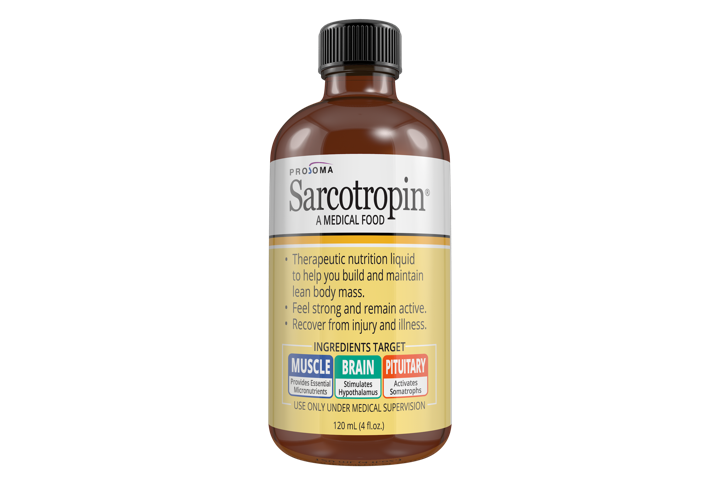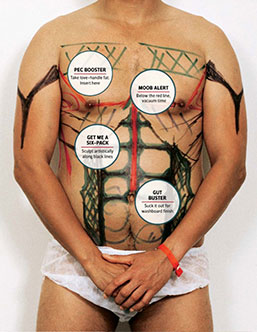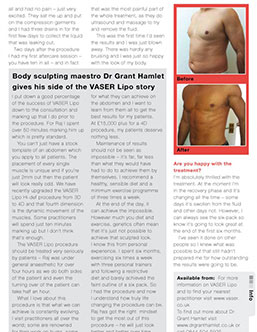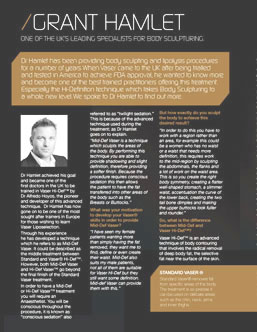Sarcotropin is a physician-ordered medical food that combats common changes caused by ageing. The older we are, the more our body is physically unable to keep up with the same pace we set for ourselves in our youth – energy levels falter, muscles begin to atrophy, libido wanes, and troublesome fat gets deposited in different places on our physique.
Leading an active, healthy lifestyle doesn’t dictate our body’s composition and mood anymore. To counteract these changes, Dr Grant Hamlet, an internationally renowned cosmetic surgeon, is proud to offer his London clientele Sarcotropin. This medical supplement supplies the necessary peptides to reignite and restore our body’s natural baseline. If you would like to learn more about Sarcotropin, please schedule a consultation at our View Road clinic or call our friendly front desk at 0207 127 4377.
Table of Contents
ToggleAbout
Sarcopenia is a natural pathology that decreases mobility, lean muscle mass, and metabolic health while increasing fat storage.[1] It is a common condition that affects some people differently than others. The only way to properly treat it is to catch it before its cyclical effects gradually worsen. As we get older, we may not be as active as we used to be. This chronic inactivity slowly causes increased fat storage and strengthens the likelihood of adult-onset obesity.
Obesity can impair the regenerative capacity of new skeletal muscle fibres to form[2] and atrophies existing muscle into fat. So, the growing fat cells begin to replace muscle fibres. Next, the fat cells generate low-grade inflammation by decreasing insulin sensitivity. Along with increased blood pressure and cholesterol, a decrease in insulin sensitivity results in poor metabolic health that invigorates the sarcopenia cycle.[3] With poor metabolic health, we might not have the energy to keep up and work off those few extra pounds of fat. Over time, this can lead to serious health conditions. If left untreated and ignored, people with severe sarcopenia can see the number on the scale continue to rise while energy levels and muscle mass inversely decline.
Request Information to Order
About Sarcotropin
Sarcotropin combines five active ingredients to combat the vicious cycle of sarcopenia. Those five ingredients include:
Ipamorelin
Ipamorelin is a synthetic peptide made by conjoining five different amino acids. It selectively binds with cellular receptors and causes the pituitary gland to release natural growth hormone. This interaction can influence appetite regulation, fat processing, and increase energy use while also restoring gastrointestinal health.[4]
Pralmorelin
Consisting of six amino acids, pralmorelin is a peptide that markedly increases plasma levels and regulates growth hormone production.[5] Increased plasma levels positively affect the blood’s viscosity which in turn decreases the risk of cardiovascular and cerebrovascular diseases. This peptide also plays an important role in bone and muscle growth, food intake, and improving recovery after an injury.
Ghrelin
First discovered in 1999, ghrelin is a gastrointestinal peptide that stimulates growth hormone release from the anterior pituitary gland.[6] Famously known as the “hunger hormone”, ghrelin has been shown to regulate glucose levels by inhibiting insulin secretion and balancing energy intake and energy expenditure.[7] Since dysregulation of energy results in obesity,[1] this simple peptide is thought to play an important role in weight control. In addition to these benefits, ghrelin also helps with:[8]
- Food intake
- Increase gut functions and health
- Improves sleep
- Modulates stress and anxiety
- Protects against muscle atrophy
- Improves cardiovascular health
- Helps burn unnecessary fatty tissue
Cholicalciferol (Vitamin D)
Vitamin D is a natural mineral found in our body, but many people unknowingly have a vitamin D deficiency. 80% of our body’s vitamin D supply comes through sunlight on our skin.[9] However, if people don’t get the necessary sunlight or supplementation to maintain healthy vitamin D levels, then health complications arise. Vitamin D stimulates calcium and phosphate absorption in our intestines. These two minerals are vital in rebuilding to support a healthy musculoskeletal system. In studies, vitamin D enhanced calcium absorption by 30%-40% and phosphate absorption by 80%.[10] Because of its positive effects on bone health and our body’s musculoskeletal system, vitamin D was used in the early 20th century to prevent and treat a nationwide osteomalacia (rickets) epidemic. But in the last few years, researchers have found that vitamin D is critical in treating cardiovascular, autoimmune, and neurological diseases.
Mucuna Pruriens
Mucuna Pruriens is a natural herb from the Velvet Bean that was first utilized in ancient medical treatments. This herb contains high levels of L-dopa – the precursor neurotransmitter to dopamine. Recently, studies have shown that not only is mucuna pruriens a natural treatment for Parkinson’s, it can also decrease cortisol levels, thereby reducing psychological stress. Because of this lowered states of stress, researchers also found an increase in sperm count of the men they studied.[11]
Treatable Conditions
Because of this balance and calculated formula of peptides, vitamins, and herbs, Sarcotropin can treat many different conditions at once. Those conditions include:
- Muscle loss
- Lower libido
- Decreased energy levels
- Gut health
- Increase in fat
Candidates
Men who experience any of the aforementioned conditions can benefit from scheduling a consultation with Dr Hamlet to discuss how Sarcotropin or any of our other anti-ageing treatments can improve their quality of life. Typically, patients interested in Sarcotropin are over the age of 40 and have noticed a gradual decline in many facets of their life – whether in the gym, in the bedroom, or in everyday life. A man’s vitality is important even in his later years. If you are interested in learning more about Sarcotropin, do not hesitate to schedule a personal consultation with Dr Hamlet at his View Road offices.
Personal Consultation
Dr Grant Hamlet is an internationally renowned cosmetic surgeon whose knowledge, experience, and skills have led him to be one of the most sought surgeons and teachers in the cosmetic industry. He has become one of the leading experts in VASER liposculpture surgeries and trains medical professionals from all around the world in this revolutionary technology.
We will begin your consultation with a brief medical intake interview and a physical examination. During this time, we will want to learn about your symptoms and when you started noticing a decline from your healthy baseline. Next, we will ask questions about your current diet and exercise regimens you might do. We will take a blood sample to get a better overview of what your current levels are. While Sarcotropin may be the ideal addition to your daily routine, we might recommend a more hands-on approach if your levels require it. Other ways we treat hormonal imbalances is Hormone Replacement Therapy and Testosterone Replacement Therapy. Because these three options have unique advantages, it is best to speak with Dr Hamlet and his expert team before determining which approach is best for you.
FAQ
What is Sarcotropin?
Sarcotropin is a compound of nutrients, natural peptides, and herbs to combat signs of ageing. It contains active amounts of Ipamorelin, Pralmorelin, vitamin D, Ghrelin, and Mucuna Pruriens.
What is sarcopenia?
Sarcopenia is a common medical condition that causes decreased mobility, lower muscle mass, poor metabolic health, an increase in fatty tissue, lower libido, and decreased energy.
References
- Hunter, G. R., Singh, H., Carter, S. J., Bryan, D. R., & Fisher, G. (2019). Sarcopenia and Its Implications for Metabolic Health. Journal of obesity, 2019, 8031705. https://doi.org/10.1155/2019/8031705
- Akhmedov, D., & Berdeaux, R. (2013). The effects of obesity on skeletal muscle regeneration. Frontiers in physiology, 4, 371. https://doi.org/10.3389/fphys.2013.00371
- Fisher, G., Windham, S. T., Griffin, P., Warren, J. L., Gower, B. A., & Hunter, G. R. (2017). Associations of human skeletal muscle fiber type and insulin sensitivity, blood lipids, and vascular hemodynamics in a cohort of premenopausal women. European journal of applied physiology, 117(7), 1413–1422. https://doi.org/10.1007/s00421-017-3634-9
- Wren, A. M., Seal, L. J., Cohen, M. A., Brynes, A. E., Frost, G. S., Murphy, K. G., Dhillo, W. S., Ghatei, M. A., & Bloom, S. R. (2001). Ghrelin enhances appetite and increases food intake in humans. The Journal of clinical endocrinology and metabolism, 86(12), 5992. https://doi.org/10.1210/jcem.86.12.8111
- Adis Editorial. Pralmorelin. Drugs R D 5, 236–239 (2004). https://doi.org/10.2165/00126839-200405040-00011
- Kojima, M., Hosoda, H., Date, Y., Nakazato, M., Matsuo, H., & Kangawa, K. (1999). Ghrelin is a growth-hormone-releasing acylated peptide from stomach. Nature, 402(6762), 656–660. https://doi.org/10.1038/45230
- Müller, T. D., Nogueiras, R., Andermann, M. L., Andrews, Z. B., Anker, S. D., Argente, J., Batterham, R. L., Benoit, S. C., Bowers, C. Y., Broglio, F., Casanueva, F. F., D’Alessio, D., Depoortere, I., Geliebter, A., Ghigo, E., Cole, P. A., Cowley, M., Cummings, D. E., Dagher, A., Diano, S., … Tschöp, M. H. (2015). Ghrelin. Molecular metabolism, 4(6), 437–460. https://doi.org/10.1016/j.molmet.2015.03.005
- Pradhan, G., Samson, S. L., & Sun, Y. (2013). Ghrelin: much more than a hunger hormone. Current opinion in clinical nutrition and metabolic care, 16(6), 619–624. https://doi.org/10.1097/MCO.0b013e328365b9be
- Pilz, S., Zittermann, A., Trummer, C., Theiler-Schwetz, V., Lerchbaum, E., Keppel, M. H., Grübler, M. R., März, W., & Pandis, M. (2019). Vitamin D testing and treatment: a narrative review of current evidence. Endocrine connections, 8(2), R27–R43. https://doi.org/10.1530/EC-18-0432
- Nair, R., & Maseeh, A. (2012). Vitamin D: The “sunshine” vitamin. Journal of pharmacology & pharmacotherapeutics, 3(2), 118–126. https://doi.org/10.4103/0976-500X.95506
- Shukla, K. K., Mahdi, A. A., Ahmad, M. K., Jaiswar, S. P., Shankwar, S. N., & Tiwari, S. C. (2010). Mucuna pruriens Reduces Stress and Improves the Quality of Semen in Infertile Men. Evidence-based complementary and alternative medicine : eCAM, 7(1), 137–144. https://doi.org/10.1093/ecam/nem171












